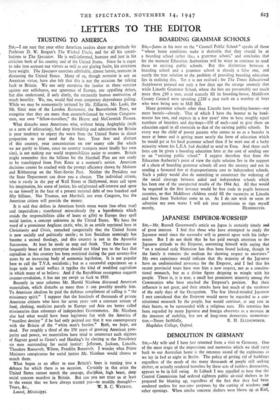BOARDING GRAMMAR SCHOOLS
Sm,—Janus in his note on the " Council Public School " speaks of those " whose home conditions make it desirable that they should be at a boarding school rather tha., a grammar school," and concludes that for the moment Education Authorities will be wiser to continue to send these to existing public schools. But this distinction between a boarding school and a grammar school is already a false one, and surely the true solution to the problem of providing boarding education lies in realising this. Yet it is not realised ; for The Times Educational Supplement pointed out only a few days ago the strange anomaly that while Lincoln Grammar School, where the fees are presumably not much more than £80 a year, could scarcely fill its boarding-house, Middlesex County Council were spending £210 a year each on a number of boys who were being sent to Mill Hill.
Many grammar schools other than Lincoln have boarding-houses—not mere hostels—already. That of which I have the honour to be head- master has two, and expects in a few years' time to have roughly equal numbers of boarders and day-boys-150 of each—and to give them an education equal in all essentials to that of the existing public schools. In every way the child of poorer parents who comes to us as a boarder is more at home and is getting more nearly the form of education which he would get at his local grammar school than if he were one of a lucky minority whom his L.E.A. had decided to send to Eton. And three such boys can be given a boarding education here at the cost of sending one to an " existing public school." I suggest therefore that from the Education Authority's point of view the right solution lies in the support of a chain of boarding grammar schools all over the country and not in sending a favoured few at disproportionate cost to independent schools. Such a policy would also do something to counteract the widening of the social cleavage between aided and independent schools which has been one of the unexpected results of the 1944 Act. All that would be required in the first instance would be free trade in pupils between counties, so that Middlesex children could fill the vacancies at Lincoln and boys from Yorkshire come to us. As I do not wish to seem to advertise my own wares I will ask your permission to sign myself






























 Previous page
Previous page